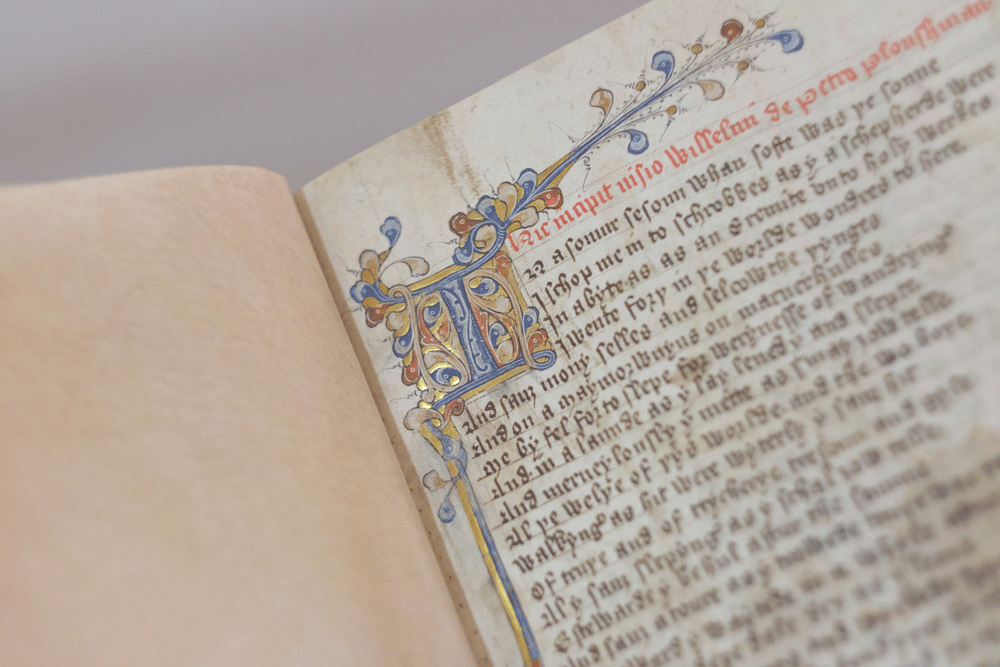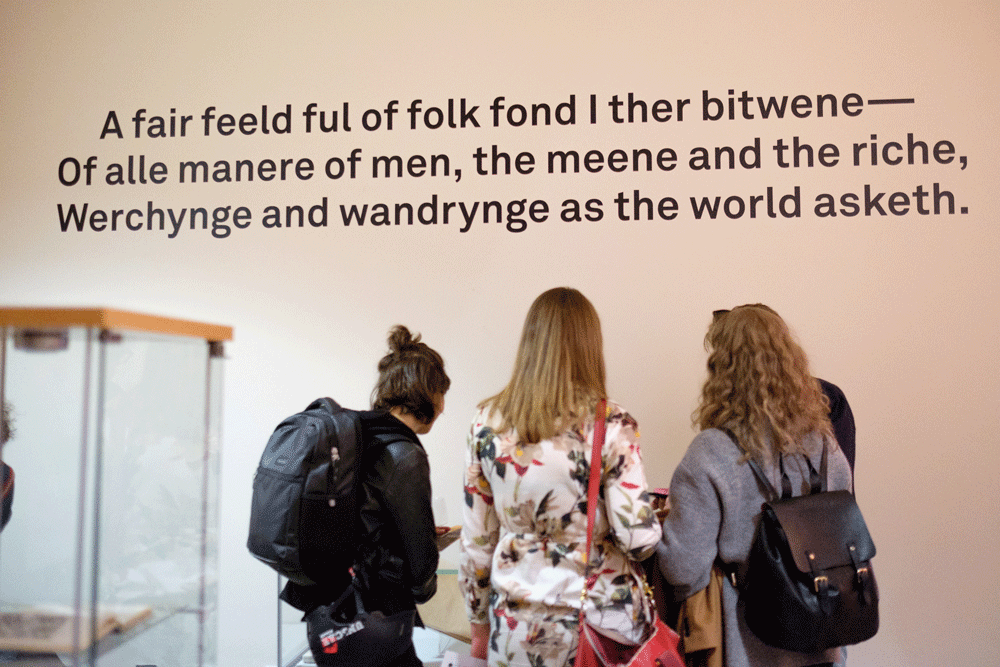
Fair Field, a theatrical reimagining of the medieval poem Piers Plowman, will premiere at Ledbury Poetry Festival and Shoreditch Town Hall this summer. Eleanor Turney asks artistic co-director Tom Chivers why he’s bringing a 650-year-old poem into the modern day.
Poet and arts producer Tom Chivers fell in love with the 7,000-line medieval poem Piers Plowman as an undergraduate at St Anne's College, Oxford. “This is better than Chaucer, I thought! I was excited by how weird it was, and how wild.” But it was almost ten years later, after pulling his old university copy from the bookshelf at random, that the idea of a theatrical production began to emerge. “I was immediately hit by how many parallels there are between the world of Piers Plowman, and the world that we're currently in. Piers Plowman is, fundamentally, a poem of crisis.”
“It’s a bustling panorama of medieval life – you name the problem and it’s there”
Written in the late fourteenth century by the Herefordshire poet William Langland, Piers Plowman is an allegorical dream-vision that tells the story of a wandering dreamer who ends up on a quest to find Truth. The dreamer, whose name is also William, or Will, is an archetypal anti-hero – “an unreliable narrator,” as Chivers puts it, “like Don Quixote or Stephen Dedalus. At the start of the poem, Will falls asleep in the Malvern Hills in Herefordshire and then sees a vision of the world as a ‘fair field full of folk, working and wandering’ – a bustling panorama of medieval life. But this dreamscape is beset by problems: spiritual decay, corruption, binge drinking, you name it and it’s there.”
[Trailer] Fair Field: A medieval masterpiece is coming back to life from Penned in the Margins on Vimeo.
Despite being firmly situated in the medieval Christian imagination, with its focus on sin, confession and penance, Piers Plowman has clear links to modern day problems. “In the very first section,” says Chivers, “Langland attacks absentee priests who spend none of their time in their parish, but instead live in London, effectively at the taxpayers’ expense, whilst their parishes starve.”
Abuse of power and the corrupting influence of money are key ideas in Piers Plowman, and whilst modern parallels are never far away, these ideas emerge from stark historical reality. The fourteenth century was a time of incredible social and economic change, in which old feudal hierarchies were coming under pressure from an assertive labour force and new forms of trade – what we might identify as early capitalism. It’s a theme, according to Chivers, taken up by the journalist Paul Mason in his book Postcapitalism. “In high feudalism,” Mason writes, “credit is seen as sinful. So when money and credit burst through the boundaries and create a market system, it feels like a revolution.”

This sense of the dangerous, revolutionary power of money floods through Piers Plowman. “Everyone seems to be on the make,” says Chivers, “from false beggars and dodgy friars to ‘regraters’ – city merchants who buy up food in one market, mark up the price and unload it in another market.” Langland concentrates an entire early passage of the poem on a character who literally (well, allegorically) is money. Named after a now-obsolete term meaning ‘reward’ or ‘pay’, Lady Mede is due to be married to False when the wedding preparations are interrupted by a surprise revelation: she has previously been betrothed to Truth. Through this simple conceit, Langland stages a nuanced (if occasionally impenetrable) debate about the use and abuse of money. “I think it’s a mark of Langland's pragmatism that he doesn't give us any glib moral solutions,” says Chivers. “Lady Mede herself gives a fine defence of money as charity and paying a fair wage. It's a carefully poised argument that seems as alive today as it did 650 years ago.”
Piers Plowman is said to have influenced Geoffrey Chaucer. But what makes Langland's poem stand apart from The Canterbury Tales, argues Chivers, is the semi-autobiographical figure of the dreamer, Will. “We don't know much about Langland, but the poem seems to suggest that he is an itinerant cleric in minor orders. In other words, he wasn't an ordained priest with all the privileges that brought with it, but instead had to live on his wits by singing prayers for people's souls in exchange for money. It is exactly this kind of precarious labour – badly paid and morally compromised – that worries him throughout the poem. It is the source of his obsession with work and money. What is an appropriate job, and what is the fair reward for that job? One of my favourite scenes is when the character of Reason appears in the middle of the City of London and attacks Will for being a layabout. Can you cook, or trim hedges, or make shoes, or drive geese, etc., Reason demands? Will replies that he is ‘to wayke to worche with sykel or with sythe / And to long, lef me, lowe to stoupe’ ('too weak to work with sickle or with scythe / And too tall, believe me, to stoop low’). Instead, he explains, his job is to sing for people's souls.”
“Langland doesn't give us any glib moral solutions”
At a time when fears over migrant workers are leading to increased isolationism across the globe, Piers Plowman is especially prescient. In the decades following the Black Death of 1340, agricultural workers were in greater demand and found they could charge more for their services on the open market than they were receiving from their Lord. Several Statutes of Labourers attempted to suppress wages and limit the rights of workers to move around the country. The wandering labourer posed a threat to the established order, a threat that ultimately came to a head in the Peasants’ Revolt of 1381. There may be no clear evidence of a connection between Piers Plowman and the events of 1381, in which armies of Essex and Kentish rebels marched on London to oppose the levy of a Poll Tax, but Chivers finds the association credible. “The poem and the protest share the same moral and political universe,” he says. “John Ball, the spiritual leader of the Revolt, uses the figure of Piers the Plowman in his letters, which would have been posted up in town centres as rallying calls.” But there are differences too. “Ball was a Lollard, a radical preacher who wanted to tear down the status quo, but Langland is essentially conservative. Both see society as corrupt, but Langland wants to go backwards not forwards.”
With all these powerful ideas swirling around the text, what led Chivers to develop a theatrical production? “I wanted to do this project because I felt that the poem is an extraordinary and highly relevant work of English literature that needs to be engaged with more,” he explains. “There are obvious barriers to people accessing Piers Plowman – the language, the theology, the sheer length of it. And this is where theatre comes in. It’s live, immediate and physical. You can build a world and engage people on their own terms. I wanted to make something really accessible but which also honoured the poem’s wildness at the same time.”

The resulting production, Fair Field, is definitely not a conventional piece of theatre. For a start, it is highly collaborative, involving Breach Theatre, whose show TANK was the toast of the 2016 Edinburgh Fringe; early music artists the Society of Strange and Ancient Instruments; theatre-makers Francesca Millican-Slater and Nick Field, poets Steve Ely and Ross Sutherland, and playwright Annette Brook. “Piers doesn’t follow a traditional narrative, and I felt that commissioning a group of writers and performing artists would be the best way to respond to its weird, rather episodic structure. The whole thing is a dream, after all. It also gives me a degree of plausible deniability,” Chivers adds. The whole production opens in the Malvern Hills with an outdoor spectacle involving live music, a procession and (cryptically) “pie-selling”.
“It's a cycle of five performances,” Chivers explains, “happening in unexpected places. As well as the beautiful Malverns, we'll be in a church, a derelict library and a bona fide medieval hall in Ledbury. And then we decamp to London to perform in the labyrinthine basement of Shoreditch Town Hall.”
What can audiences expect from this sprawling project? “I think they can expect a really rigorous and challenging interrogation of the big themes,” says Chivers. “The themes of faith and spirituality, of moral behaviour – what we deem good and bad behaviour – of money and power. But it won't be dry or academic. I want to capture the extraordinary, hallucinatory quality of Langland's writing. At the start of the poem, the Dreamer says he went ‘wide in this world, wonders to hear’. So the audience is going to be able to hear wonders, whether that's the unsettling and uplifting music of the Society of Strange and Ancient Instruments, or Ross Sutherland's urgent radio broadcasts from the 14th century. For one event, you will be able to meet all of the Seven Deadly Sins, culminating in a feast hosted by Gluttony (played by sugar-fiend Nick Field). In the poem, Gluttony goes on a binge drinking session, vomits over another character and then suffers from a two-day hangover. That scene’s a great example of the way that Langland – perhaps above all other medieval poets – brings together a moral critique and humour and religion, all in the language of the poetry. So I hope audiences will be able to hear that language, and also see the world it creates. It’s going to be intellectually engaging, but also physical, sensual and spectacular.”
“The Medieval is about as popular as it’s ever been at the moment”
If Langland was a documenter of the times he found himself in, who, I ask, might be a contemporary equivalent? “Well, Piers Plowman is a political satire, in part, and Langland doesn't pull his punches, so maybe one of the new generation of spoken word artists – Kate Tempest or Luke Wright or someone like that. Or maybe a comedian? Frankie Boyle could have written Gluttony’s Feast. No, he’s too harsh. Langland is an equivocator, a real fence-sitter. He’s always contradicting himself. So he will have these incredibly powerful passages where he attacks people for their immoral behaviour, and then in the next line he'll say, ‘Oh but they're still going to be saved at the end of time’. So he lets people off the hook. Everyone apart from himself. Maybe Stewart Lee, then.” He pauses, mulling it over. “The truth is, there's no one like Langland. He’s a one-off. You know, when I was in the Malvern Hills last autumn, the poet Steve Ely told me he had spotted lots of magic mushrooms growing wild. That explains a lot about Piers Plowman, I said.”
The Medieval is about as popular as it’s ever been at the moment, with The Lord of the Rings films, Game of Thrones, The Last Kingdom, countless video games… What is it about this period that gets people excited? “I think it’s partly the strangeness,” says Chivers. “It’s far away enough to feel a bit alien, and that’s one of the problems with many of these screen productions. They end up romanticising the Medieval, or turning it into Hollyoaks with swords – hipster Vikings with top-knots and all that. But actually we know a great deal about the Medieval age, its art, its culture, its society and spirituality.”
So should we be aiming for more authentic renditions of the Medieval? “No, not at all! At least, not if authenticity means CGI and a massive props budget. I’d like to see more innovative approaches that are about being authentic to the spirit of the Medieval, not merely its outward appearances. There’s a great novel by Paul Kingsnorth called The Wake, written in a ‘shadow Anglo-Saxon’, that I think does that. And of course everything Umberto Eco ever wrote.”
So can you see a film version of Piers Plowman ever being made, I ask? “Well, apparently the filmmaker Derek Jarman always wanted to write a screenplay of the poem, and never did, so if he couldn't make it I doubt anyone could. But the one thing I can see is a graphic novel of Piers Plowman. I think that could work really well, actually.”